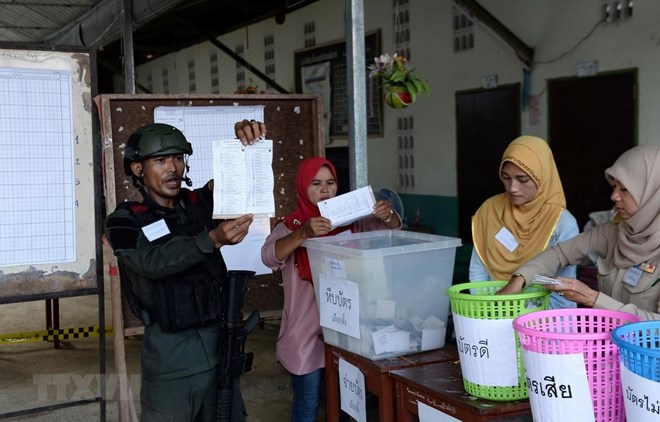
The Election Commission (EC) of Thailand on March 28th announced the results of the country’s general election which took place four days earlier.
According to
the EC, the Palang Pracha Rath party, which backs the incumbent Thai Prime
Minister Prayut Chan-o-cha, won the largest number of votes with 8.43 million,
followed by the main opposition – the Pheu Thai party with 7.92 million votes.
The Future
Forward party earned 6.26 million votes, while the Democrats and the Bhumjaithai Party (BJT) gained 3.94 million and 3.73
million votes, respectively.
Voter turnout
stood at 74.69 percent with 5.57 percent of invalid votes, similar to the 2011
election.
 The
Election Commission (EC) of Thailand
on March 28th announced the results of the country’s general election which
took place four days earlier (Photo: AFP/VNA)
The
Election Commission (EC) of Thailand
on March 28th announced the results of the country’s general election which
took place four days earlier (Photo: AFP/VNA)
The votes are used to calculate the number of seats in the House of
Representatives of each party. Palang Pracha Rath has obtained 97 seats, while
the Pheu Thai won 138.
Previous
results announced by the EC were based on 95 percent of counted votes.
However, the
results will not be approved until May 9th as relevant agencies need time to
handle official complaints, of which there are 186 thus far, said the EC.
On March 25th,
the EC delayed without explanation the announcement of preliminary results of
the general election – the first of its kind in the country since a military
coup five years ago.
The general
election in Thailand
took place on March 24th with over 50 million people eligible to cast votes.
A total of 81
parties competed in the election, with thousands of candidates vying for 350
constituencies. The other 150 members of the House of Representatives will be
elected from the national party lists under a system of proportional
representation.
The election
was observed by a group representing foreign countries and international
organisations. The group includes those from foreign embassies in Bangkok, such as that of Australia,
Bhutan, Cambodia, the Republic
of Korea, and Vietnam.
Source: DCS
Many countries are grappling with rapidly aging population. As population aging becomes an irreversible global trend with significant impacts on economic and social sectors, nations face the urgent task of creating flexible policies to adapt to and make the most of this trend to build prosperous and sustainable societies.
With a series of stimulus measures, the world tourism industry is on the way to recovery as before the COVID-19 pandemic broke out. Facing the opportunity to take off, the "smokeless industry” is expected to strongly contribute to global economic growth while promoting potential and cohesion, contributing to peace and sustainable development.
The danger from the COVID-19 pandemic is still latent, threatening people’s health and lives in the context that the immunity provided from the COVID-19 vaccine has decreased. Many other dangerous diseases are also likely to break out when the global vaccination rate slows down, due to inequality in access to health services, vaccine hesitancy, and consequences of economic recession.
The Association of Southeast Asian Nations (ASEAN) is witnessing a rise in the sales of electric vehicles (EVs) in Vietnam, Malaysia and Indonesia, according to Maybank Investment Bank Research (Maybank IB Research).
The respect paying ceremony for Party General Secretary Nguyen Phu Trong continued on the morning of July 26 at the National Funeral Hall in Hanoi, with high-level delegations from foreign countries and international organisations paying their last respects and expressing deep condolences.
A wave of condolences have poured in from world leaders, international organisations, rulling parties, Communist parties and partner parties following the death of Vietnamese Party General Secretary Nguyen Phu Trong.



 The
Election Commission (EC) of Thailand
on March 28th announced the results of the country’s general election which
took place four days earlier (Photo: AFP/VNA)
The
Election Commission (EC) of Thailand
on March 28th announced the results of the country’s general election which
took place four days earlier (Photo: AFP/VNA)